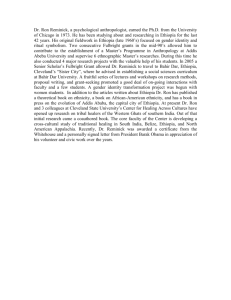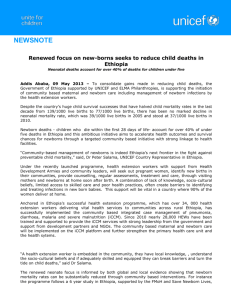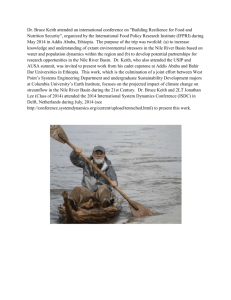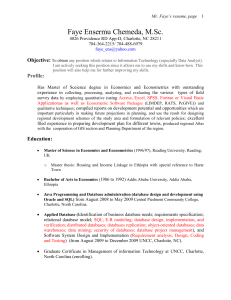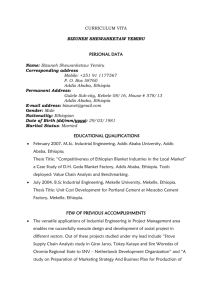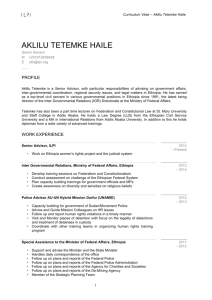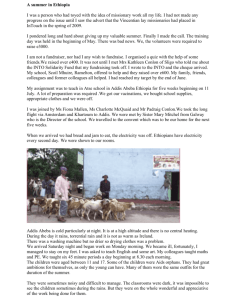Terms of Reference with Guidance notes
advertisement
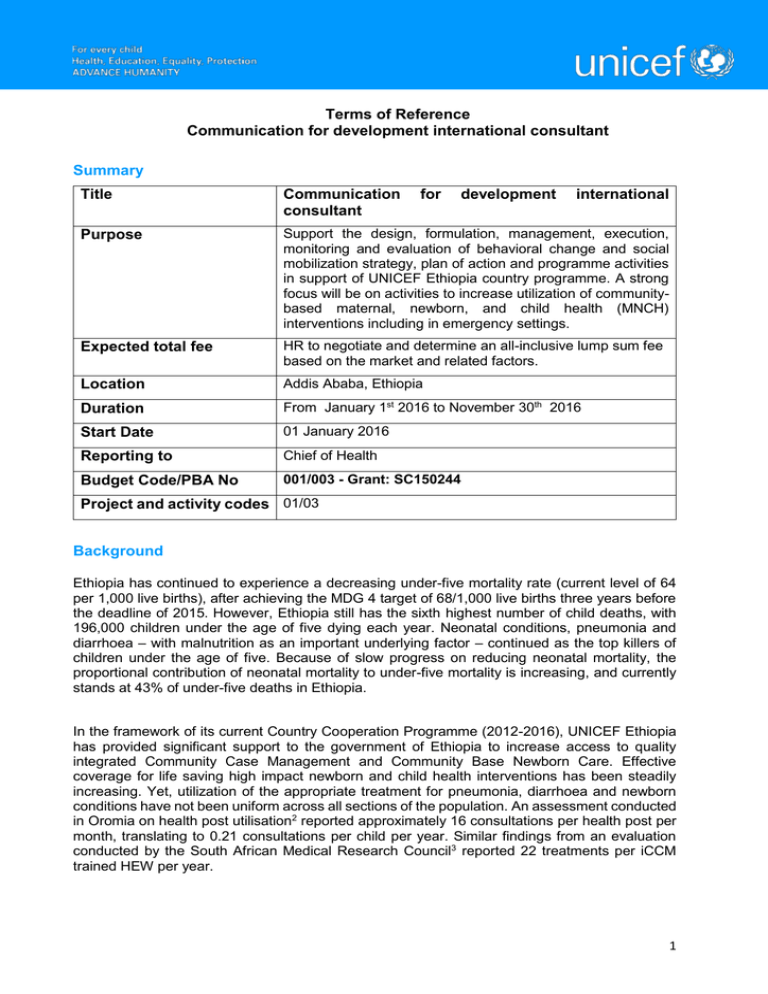
Terms of Reference Communication for development international consultant Summary Title Communication consultant for development international Purpose Support the design, formulation, management, execution, monitoring and evaluation of behavioral change and social mobilization strategy, plan of action and programme activities in support of UNICEF Ethiopia country programme. A strong focus will be on activities to increase utilization of communitybased maternal, newborn, and child health (MNCH) interventions including in emergency settings. Expected total fee HR to negotiate and determine an all-inclusive lump sum fee based on the market and related factors. Location Addis Ababa, Ethiopia Duration From January 1st 2016 to November 30th 2016 Start Date 01 January 2016 Reporting to Chief of Health Budget Code/PBA No 001/003 - Grant: SC150244 Project and activity codes 01/03 Background Ethiopia has continued to experience a decreasing under-five mortality rate (current level of 64 per 1,000 live births), after achieving the MDG 4 target of 68/1,000 live births three years before the deadline of 2015. However, Ethiopia still has the sixth highest number of child deaths, with 196,000 children under the age of five dying each year. Neonatal conditions, pneumonia and diarrhoea – with malnutrition as an important underlying factor – continued as the top killers of children under the age of five. Because of slow progress on reducing neonatal mortality, the proportional contribution of neonatal mortality to under-five mortality is increasing, and currently stands at 43% of under-five deaths in Ethiopia. In the framework of its current Country Cooperation Programme (2012-2016), UNICEF Ethiopia has provided significant support to the government of Ethiopia to increase access to quality integrated Community Case Management and Community Base Newborn Care. Effective coverage for life saving high impact newborn and child health interventions has been steadily increasing. Yet, utilization of the appropriate treatment for pneumonia, diarrhoea and newborn conditions have not been uniform across all sections of the population. An assessment conducted in Oromia on health post utilisation2 reported approximately 16 consultations per health post per month, translating to 0.21 consultations per child per year. Similar findings from an evaluation conducted by the South African Medical Research Council3 reported 22 treatments per iCCM trained HEW per year. 1 The Government of Ethiopia and UNICEF recognize service utilization of maternal, newborn and child health interventions including integrated Community Case Management and Community Base Newborn Care (iCCM/CBNC) as a key challenge that must be prioritized and addressed for solid and sustained gains in child mortality reduction. Justification The BMGF-UNICEF-PATH partnership is being established in Ethiopia to support the government’s efforts to increase demand and access to quality community-based newborn and child health care services. The project will review evidence on barriers to care seeking and test community mobilization strategies to increase care seeking from HEWs. The focus will be on implementing and testing innovative approaches at scale to address critical demand and supply bottlenecks and increase utilization of iCCM and CBNC services. In order to support this initiative, UNICEF Ethiopia is seeking a Communication for Development (C4D) Consultant with relevant experience to provide high quality technical assistance and services to design, manage, and facilitate the implementation of programme communication and demand creation strategy, plan of action and activities for strategic communication and promotion for social and behavioural change in support of country programme delivery. Specific Tasks The specific responsibilities of the C4D consultant are to: Design, manage, and facilitate the implementation of evidence based, multi-level programme communication and demand creation strategy, plan of action and activities for social and behavioural change in support of country programme delivery. In collaboration with UNICEF management and decision makers and planners of government, donor organizations and the private sector, the Communication for Development Specialist designs, manages and facilitates the implementation of communication policy, strategy and plans of action aiming at general public and service providers through: (a) behaviour development/change at individual/household levels; (b) social mobilization of civil society organizations; (c) increased community participation in development programmes for positive social change; and (d) working with partners to address structural barriers to service utilization. In collaboration with partners, map multi-media materials currently in use, identify gap, consolidate messages and based on this propose priority materials that need to be developed … Organize the research, development, pre-testing, and production of culturally relevant multi-media communication materials. Make viable recommendations on operational strategies in the areas of participatory communication, social mobilization and behaviour change and on appropriate materials and media to reach target audiences in diversified contexts. In collaboration with partners, ensure the quality, consistency and appropriateness of communication materials that are developed, produced, and disseminated to local communities, government officials, other partners and the press. Develop partnership to strengthen capacity of various networks and platforms including; the media, religious groups, influential community based organizations, as well as civil society organizations, work with ECO C4D team to build on office wide cross-sectoral partnership initiatives, mobilize these group towards implementation of scalable and locally relevant social and behavior change communication 2 Develop training materials and activities to build capacity for participatory and behaviour change communication for personnel who are involved in the planning, implementation and evaluation of programme communication intervention, in support of programme sustainability. Coordinate with government counterparts in the development and appropriate use of communication for social development aimed at both individual behaviour change and collective action. Provide technical support as required. Monitor and evaluate programme activities on the basis of applied communication research and frequent visits to project sites. This includes strong oversight of activities to increase utilization of community-based MNCH interventions. Analyze and evaluate data to ensure compliance and achievement of objectives and recommend corrective action, when necessary, to meet programme/project objectives. Prepare monitoring and evaluation reports in accordance with the established guidelines, methods and procedures. Provide technical advice to programme staff, government officials and other counterparts, and coordinates and manages the evaluative elements of country programme milestone meetings, such as mid-term reviews, strategy meetings, previews and reviews and annual reviews. Methodology The Consultant will sit in the UNICEF Office in Addis Ababa; He will be required to work in close coordination and cooperation with the UNICEF field offices, Federal Ministry of Health; Regional Health Bureaus, PATH, Local Universities and NGOs partners staff in Addis Ababa and in the regions; The consultant will closely work with the multi-sectoral C4D team in ECO particularly to build on cross-sectoral initiative. The consultancy requires field visits in the regions; Expected Deliverables 1. Programme communication and demand creation strategy and plan of action strategically developed and formulated, and the implementation effectively managed, facilitated and executed for social and behavioural change in support of efficient and effective programme delivery. 2. Culturally relevant programme communication materials designed, pre-tested, and produced timely, meeting requirements and quality standards. 3. Strong platforms and partnerships with community groups, leaders and other partners in the community and civil society developed and enhanced for promotion of participation in social and behavioural changes supportive of programme goals. 4. Effective training materials and activities organized, developed and implemented to build capacity in participatory and behaviour communication at community and various government levels. 3 5. Technical support effectively provided with government counterparts in the development and effective use of communication for social development. 6. Monitoring and evaluation of programme activities and preparation of reports timely and properly undertaken. Findings, experiences, lessons learned, best practices and new methods effectively shared with government officials, programme staff, and other partners. Reporting The consultant will report to the Chief of section Expected background and Experience Advanced university degree in the social/behavioral sciences (Communication, Sociology, Anthropology, Psychology, Health Education…) with proven experience in the field of Communication for development, health education/promotion, community mobilization, social marketing, participatory communication, new technologies and research. At least 5 years of progressively responsible professional work experience in the development, planning and management of social development programmes, including several years in developing countries -preferably in Sub-Saharan Africa, with practical experience in the adaptation and application of communication strategy planning processes to specific programmes. Excellent analytical and advocacy skills, Excellent writing and presentation skills in English; Experience in team working in culturally diverse contexts. Initiate and execute activities in a timely manner General conditions: Procedures and Logistics The transport fee/flight costs/from and to Addis Ababa will be covered (Economy class) The consultancy will require field visits in the regions. The consultant is authorized to have access to UNICEF transport when travel outside the Addis Ababa. The consultant should provide his/her own computer UNICEF will pay to the consultant based on a satisfactory performance and as per the below terms of payments. 4

